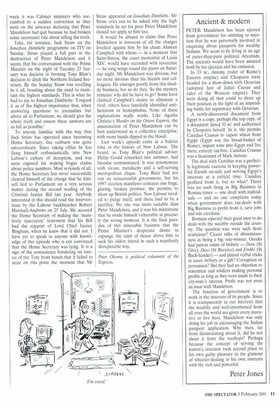Ancient & modern
PETER Mandelson has been ejected from government for omitting to mention that he was personally involved in enquiring about passports for wealthy Indians. We seem to be living in an age of purer-than-pure political Aryanism. The ancients would have been amazed both by his ejection and his omission.
In 33 BC, Antony (ruler of Rome's Eastern empire) and Cleopatra were headed for a show-down with Octavian (adopted heir of Julius Caesar and ruler of the Western empire). They were doing all they could to shore up their position in the light of an impending battle for supremacy with Octavian.
A newly-discovered document from Egypt is a copy, perhaps the top copy, of a document dated 33 BC and authorised by Cleopatra herself. In it, she permits Canidius Crassus to export wheat from Egypt (Egypt was the bread-basket of Rome), import wine into Egypt and live there, entirely tax-free. Canidius Crassus was a lieutenant of Mark Antony.
The deal with Canidius was a perfectly legitimate exercise in keeping powerful friends on-side and serving Egypt's interests at a critical time. Canidius profited from it, but so what? There was no such thing as Big Business in Roman times — one dealt with individuals — and no one complains today when government does tax-deals with Big Business to profit from it, save jobs and win elections.
Romans expected their great men to do deals with the wealthy outside the country. The question was: were such deals avaricious? Cicero talks of abstemiousness as being a big vote-winner. Greeks had patron saints of bribery — Dow (St Give), Dexo (St Receive) and Emblo (St Back-hander) — and played verbal tricks in court: bribery or a gift? Corruption or persuasion? But they had no objection to statesmen and soldiers making personal profits as long as they were made in their city-state's interest. Profit was not even an issue with Mandelson.
The function of government is to work in the interests of its people. Since it is transparently in our interests that the wealthy and well-intentioned from all over the world are given every incentive to live here, Mandelson was only doing his job in encouraging the Indian passport application. Why then, far from dissimulating about it, did he not shout it from the rooftops? Perhaps because the concept of serving the nation's interests took second place to his own guilty pleasure in the glamour of wheeler-dealing in his own interests with the rich and powerful.
Peter Jones


























































 Previous page
Previous page